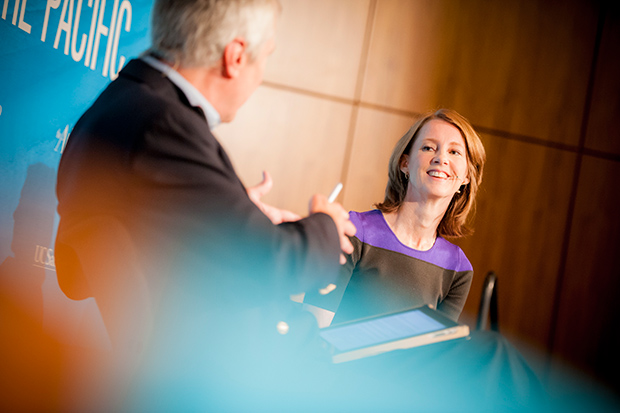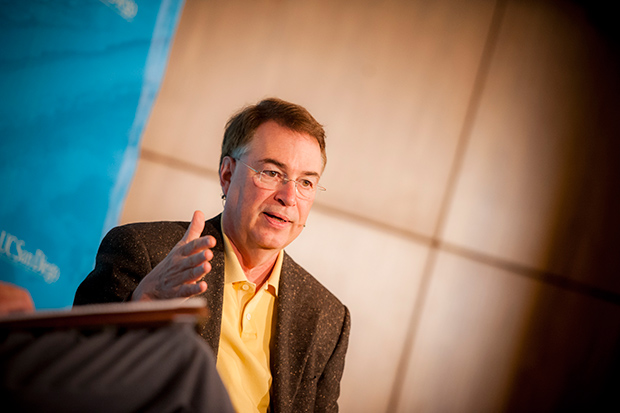Pioneering Thinkers Converge at Atlantic Meets Pacific Forum
San Diego, Calif., Oct. 11, 2012 — Author Gretchen Rubin’s “formula for happiness” could have very well been the cri de coeur for this week’s Atlantic Meets the Pacific event — the second annual collaboration between The Atlantic magazine and the University of California, San Diego.
|
“Being happier,” she writes in her bestselling book “The Happiness Project,” “requires you to think about feeling good, feeling bad, and feeling right, in an atmosphere of growth.”
The three-day conference, which follows in the tradition of The Atlantic’s prestigious Aspen Ideas Festival and the Washington Ideas Forum, had the distinct aura of being ‘an atmosphere of growth’ where some of the greatest American minds examined the many ways entertainment, technology, politics and new research into human psychology can, as Rubin puts it, “boost our good feelings, put a stop to our bad feelings, and pursue our right feelings.”
The event is something of a ‘feather in the cap’ for UC San Diego -- and in particular for Associate Vice Chancellor of Public Programs and Dean of Extension Mary Walshok, who was the driving force behind the move to establish the world-class conference series in La Jolla.
UC San Diego professors were consequently well-represented among the speakers. Included among them were Larry Smarr, director of the California Institute for Telecommunications and Information Technology (Calit2), as well as Professor of Medical Genetics and Political Science James Fowler, Professor of Political Science Samuel L. Popkin and Chief of the Division of Neuro-Oncology at the UCSD School of Medicine, Santosh Kesari. V.S. Ramachandran, director of the Center for Brain and Cognition and Distinguished Professor with the Psychology Department and Neurosciences Program at UC San Diego, was scheduled to speak but had to cancel due to illness.
For his part, Smarr spoke about his 10-year quest to quantify his health (and prevent it from deterioriating) by using a suite of digital devices that measure everything from his daily step count to the quality of his sleep. Smarr told Atlantic national correspondent Mark Bowden, who conducted the interview, that his approach will become increasingly common in the next decade, not only because it’s effective, but because it’s necessary if the U.S. is to avoid a major economic catastrophe.
“I think our nation is in a very dire situation caused by our people not taking personal responsibility for their bodies,” he remarked. “The obesity epidemic, which is unrelenting and in its fourth decade, will bankrupt this country. This is one of the biggest health emergencies in the history of our republic. But I also think there’s going to be a revolution, and it’s starting here in La Jolla.”
|
In planning the event, the organizers of The Atlantic Meets the Pacific took full advantage of La Jolla’s status as a bastion of technology and innovation. Attendees at the event were treated to tours of several hallmark facilities at UC San Diego and on nearby Torrey Pines Mesa, including Calit2, the Sanford-Burnham Medical Research Institute, the Sanford Consortium for Regenerative Medicine, The Scripps Research Institute and the Scripps Institution of Oceanography (SIO). SIO also hosted the Tuesday sessions at the Scripps Seaside Forum.
"Scripps Institution of Oceanography is proud to host this confluence of great intellectual and entrepreneurial minds on our campus," said Scripps Acting Director Cathy Constable. “We appreciate the opportunity to showcase the breadth of Scripps research to such an impressive group of interested thinkers, further enhancing our mission of communicating science for the benefit of society and the environment.”
This mission was mirrored in the remarks of speaker after speaker at the event, many of whom are known for their world-class research, contributions to the entertainment world, or philanthropic efforts, In addition to Rubin and Smarr, speakers and panelists at the event included famed genomicist J. Craig Venter, Co-Chairman and CEO of DreamWorks Studios Stacey Snider, Facebook’s Vice President of Product Chris Cox and Co-Founder and Executive Vice Chairman of the Michael J. Fox Foundation, Debi Brooks.
In a session called “Don’t Worry, Be Happy Now,” Atlantic Senior Editor Corby Kummer interviewed Rubin about her task-oriented, list-driven, “practical” approach to happiness, which emphasizes that little things like making one’s bed and taking the time for warm greetings and farewells can improve the quality of one’s life.
For her bestselling book, Rubin spent a year examining twelve crucial components of her own happiness, one for each month of the year. Her new book, “Happiness at Home” focuses on how to cultivate domestic peace and serenity and debuted at No. 2 on the New York Times Bestseller list.
Rubin says she learned so much about happiness from her research that she now has to hold herself back from being ‘a happiness bully’ when she sees people engaging in behaviors that are shown to undermine happiness.
“You know, people who constantly cut everything too short so their whole day is frantic, or people who won’t unplug from the phone, or people who stay up all night cruising the internet,” she noted. “You’ve got to go to bed on time!”
One point that seemed to particularly resonate with the very plugged-in audience (Twitter comments can be read at #AtlanticMeetsPacific) was Rubin’s advice to set boundaries and time limits for electronic devices, especially in the context of family time.
“With these devices in our pockets we have this sense of constantly needing to connect and also this sense of being hunted;,” she remarked. “What works is to set boundaries: From 6-9 p.m. is family time and you put your cell phone in an inconvenient drawer. Some people even follow a ‘tech Sabbath’ where they take a day off from technology.” Rubin says she keeps her own phone on ‘mute’ and has disabled audible tones that announce when she has a new email.
“You hear that announcement and you can’t resist checking it,” she said. “A lot of this has to do with not just falling into the mindlessness of it. Technology is a good servant but a bad master. You have to assert your domination.”
Related Links
The Atlantic Meets the Pacific
Media Contacts
Tiffany Fox, (858) 246-0353, tfox@ucsd.edu


